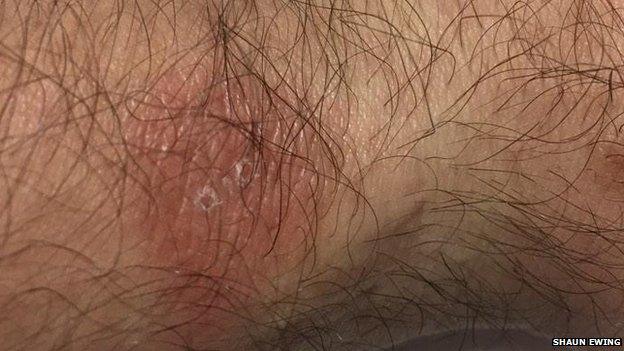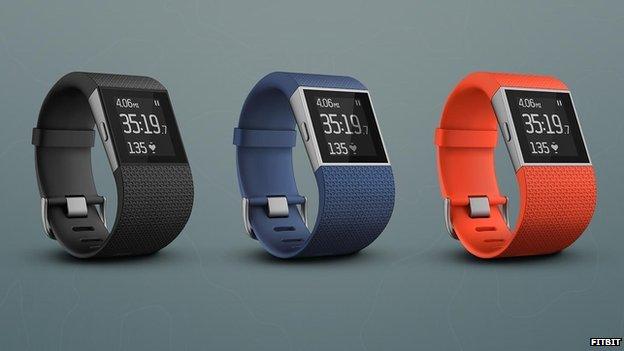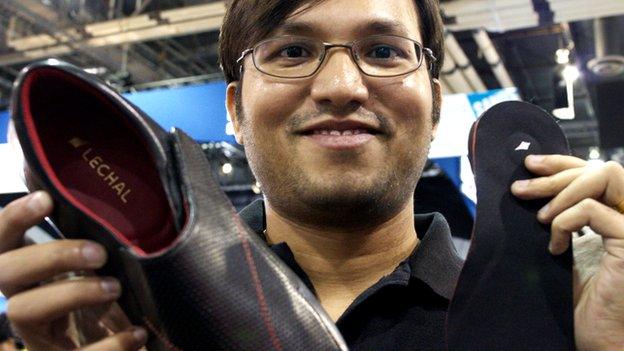Fitbit says new wearable device can cause skin rash
- Published

Lots of pictures of rashes have been posted on social media
Fitbit, the maker of wearable fitness trackers, has acknowledged that its latest device, the Surge, can cause a rash for some users.
It told news website TechCrunch that a "limited percentage" of users reported skin irritation and advised users to take a break from the device.
Fitbit had to recall its older Force wristband when a large number of users claimed it had caused skin rashes.
It comes as a report compares the accuracy of fitness trackers.
"The reactions we are seeing with new products are not uncommon with jewellery or wearable devices that stay in contact with the skin for extended periods," Fitbit said in a statement.
"According to our consulting dermatologists, they are likely from wearing the band too tight, sweat, water, or soap behind held against the skin under the device: or from pressure or friction against the skin and should resolve quickly when users take a break from the device, usually within hours or days."

The Fitbit Surge seems to have caused rashes for some wearers
The Fitbit Surge - which costs $250 (£199) - was launched four months ago and soon after, users began posting photos of skin rashes caused by wearing the device on social media sites.
Shaun Ewing posted a picture of his rash on Twitter with the message: "Having a break from my @fitbit Surge. Might need to stop wearing it - nice rash (and my skin isn't usually sensitive)."
The firm had blamed nickel for causing the rashes for Force users although some reported that they previously had no such allergies.
"Fitbit's top priority in developing its new products was to eliminate the issues we had with Force. The reactions we are seeing with new products are different from the allergic reactions we saw with Force," a spokeswoman told the BBC.
More than 200 instances of skin irritation complaints on social media have been collected in a Google document started by one affected user, external.
Wearable accuracy
Meanwhile, a study comparing wearables to the fitness apps on smartphones suggests that the latter could be more accurate when it comes to measuring physical activity.
The study, led by researchers at the Perelman School of Medicine at the University of Pennsylvania tested a range of gadgets, external including the Fitbit Flex, Fitbit One, Nike's Fuelband, the Jawbone UP24.
Fourteen participants walked on a treadmill for 500 steps and then 1,500 steps, twice each, for a total of 56 trials.
Each wore a pedometer and two accelerometers on their waist, three wristbands and carried two smartphones in their pockets loaded with fitness apps.
The data from the smartphones was only slightly different than the observed step counts (with a range of -6.7 to 6.2% relative difference) compared to a -22.7 to 1.5% difference for the wearable devices.
Some wearables though - such as the Fitbit One and the Jawbone UP24 - proved to be very accurate. The study did not include smartwatches.
"Compared to the 1% to 2% of adults in the US that own a wearable device, more than 65% of adults carry a smartphone," said report author Mitesh S Patel.
"Our findings suggest that smartphone apps could prove to be a more widely accessible and affordable way of tracking health behaviours."
None of the wearables tested included heart rate sensors. The addition of such components has helped some of the latest generation of activity trackers become more accurate.
- Published8 January 2015

- Published12 February 2015